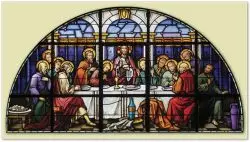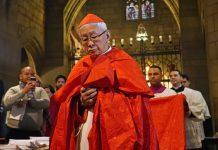The miracles and wonders wrought by the apostles also identified them as followers of Christ, but it was not the main aspect.The Divine Master wanted them to be recognized by the fulfillment of the new commandment.

Newsdesk (18/05/2025 17:15, Gaudium Press) The readings of the liturgy of this Fifth Sunday of Easter present the link between love for God and neighbour that is manifested through the acceptance of suffering.
In the Kingdom of God, one does not enter without suffering
In reading the Acts of the Apostles, St. Luke recounts the final moments of the first missionary journey of the apostles Paul and Barnabas. After evangelizing the city of Derbe, they took the way back, revisiting the places where they had passed.
“In those days Paul and Barnabas returned to the cities of Lystra, Iconium, and Antioch. Encouraging the disciples, they exhorted them to remain firm in the faith, saying to them: ‘We must go through many sufferings to enter the Kingdom of God’” (Acts 14:21b-22).
It was not without purpose that the Apostles insisted on the role of suffering with these disciples, since they witnessed with their own eyes the sufferings endured by the envoys of God in their cities: in Antioch, the rejection of the preaching of the Good News practically expelled the two Apostles, forcing them to shake the dust off their feet against the opponents; in Iconium, both were forced to flee in order not to be stoned; in Lystra, Jews from the other two cities stoned St. Paul to the point of killing him.
However, in none of these circumstances did the Apostles manifest the slightest sign of abasement. On the contrary, with each new affliction their scorched hearts pulsed more strongly, filled with joy because they found themselves worthy to suffer for love of Jesus.
Armed, then, with the force of example, the two Apostles exhorted their disciples to follow in their footsteps.
God will wipe away the tears of faithful servants
In the book of Revelation, St. John the Evangelist sees the heavenly Jerusalem coming down from God and presenting herself dressed as a wife adorned for her husband (Rev 21:2).
The image described by the beloved disciple is a reflection of the Church’s marriage bond with our Lord, for just as a wife should not adorn herself to please anyone, but her husband, so the Mystical Wife of Christ adorns herself to please Jesus.
How does the Church please her Spouse?
Just look at the example given by the Apostles in the first reading. They, as living stones of the Church, did not retreat in the face of persecution, nor did they refuse to fulfill the mission entrusted to them by the Holy Spirit.
St. John continues in his vision, saying
“This is the abode of God among men. God will live in the midst of them. They will be his people, and God himself will be with them. God will wipe away every tear from your eyes” (Rev 21:3-4).
When saying that God will live “in the midst of men”, one should not understand “along with all men”. In fact, in the previous verses, St. John describes the scene of the second death, in which those who did not have their names inscribed in the book of life are thrown into the lake of fire. So the blessed ones referred to by the author are those who have gone through the sufferings of the struggle against the followers of Satan and have not allowed themselves to be seduced by his attractions.
To these, “God will wipe away every tear from your eyes”. Who could imagine a bigger prize? The creature is comforted by the Creator! Yes, after they have suffered for the love of God, they will enjoy immense joy.
Distinctive sign of the follower of Jesus
In the Gospel, the same Apostle narrates the last moments of the life of the Man-God before the passion. When the traitor came out of the upper room, Jesus manifested that the time had come when he would be glorified.
At this peak, when the Redeemer said goodbye to his closest friends preparing for his ascent to Calvary, Jesus concentrated his teaching and summed it up by saying
“I give you a new commandment: love one another. As I have loved you, so you too must love one another” (John 13-34).
Once, Jesus had answered a Pharisee, saying: “you will love your neighbor as yourself” (Mt 22.39). But here it gives a new hue.
To those who have lived closely and who have been able to contemplate the gestures and the way of being of the Master, Jesus invites the perfection of love for others, not simply loving them as himself, but indicating the new way of loving them, that is, “as I have loved you”.
“By this all will know that you are my disciples” (Jn 13,35).
This, after all, is the distinctive sign of a disciple of Jesus.
He could say that the Apostles would be recognized by the miracles and signs they worked. But, no! The divine Master wanted to highlight the role of the example of life that they should give to the world – and nothing makes life more exemplary than love.
To love is to suffer for others with joy
There is a close link between love of neighbour and suffering, and this is the point of convergence of the readings in today’s liturgy, because human conviviality is also a cross.
How many times are we hurt by an aggressive word or a gesture of ingratitude, by a contempt or a rejection of someone we love? And it is also true that the greater the relationship of closeness, the deeper the open wound will be.
It is worth mentioning the example of St. Monica, a mother who drank the cup of bitterness given by her own son. It is hard to imagine a scene more poignant than to see a son riddling his mother’s heart with heartbreak.
However, the tears she shed for the conversion of young Augustine were not in vain. She saw her son rise from the abyss of sin, receive baptism, and become a minister of the Lord. And if today we have the good fortune to have a spiritual son of St. Augustine seated on the throne of St. Peter, it was because one day, there was someone who knew how to suffer for others with joy.
By Rodrigo Siqueira




































